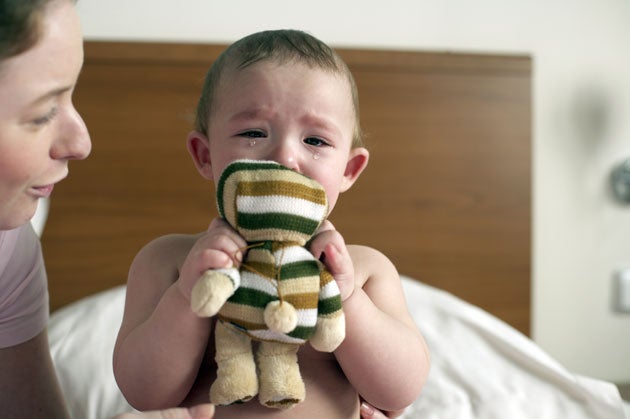Screaming babies – it's all Mum's fault for fussing
Research shows that parents anxious to comfort their children 'exacerbate' sleep problems

Your support helps us to tell the story
From reproductive rights to climate change to Big Tech, The Independent is on the ground when the story is developing. Whether it's investigating the financials of Elon Musk's pro-Trump PAC or producing our latest documentary, 'The A Word', which shines a light on the American women fighting for reproductive rights, we know how important it is to parse out the facts from the messaging.
At such a critical moment in US history, we need reporters on the ground. Your donation allows us to keep sending journalists to speak to both sides of the story.
The Independent is trusted by Americans across the entire political spectrum. And unlike many other quality news outlets, we choose not to lock Americans out of our reporting and analysis with paywalls. We believe quality journalism should be available to everyone, paid for by those who can afford it.
Your support makes all the difference.Sleep deprivation is every new parent's worst nightmare. It is a form of torture that can leave them sobbing louder than their child. Yet a new study claims babies' sleep problems are all in the mind – the mother's mind before her child is even born.
Parents have only themselves to blame for all those hours of lost sleep, according to researchers in Israel who found that a mother-to-be's expectations about infant sleep will affect how her baby sleeps after it is born.
If an expectant mother thinks that babies who cry at night are suffering distress and need comforting and soothing back to sleep, then her newborn is likely to wake more frequently during the night than if she believes babies should learn to settle themselves, according to a study in the latest issue of the journal Child Development.
Expectant mothers who believed crying babies needed their mums – or dads – tended, once their child was born, to be more active in trying to soothe them, cuddle them, feed them or let them snuggle up in the parental bed to try to get their baby back to sleep, the research showed. The downside, the study found, was that the more a baby's mum tried to help her child sleep, the worse that child's sleep then became.
"Increased parental involvement at bedtime and at night predicted a higher number of reported night wakings at 12 months," said Liat Tikotzky and Avi Sadeh, who followed 85 mothers through pregnancy and the first year of their baby's life.
The flipside was that expectant mothers who felt it important to "limit parental night-time involvement [and use] less active soothing" techniques would go on to have infants who slept better.
Experts warn the findings will heap guilt on many new mothers who already hold themselves responsible for every element of their baby's behaviour. The study vindicates those parents favouring the less-is-more, "cry-it-out" method of encouraging infants to sleep through the night. But, in a note of caution, the authors highlight the current debate regarding the consequences of leaving children to cry, pointing to a series of articles by the co-sleeping advocate James J McKenna that argue that expecting infants to self-soothe runs counter to their basic biological and emotional needs.
Sleep deprivation, which can continue well past an infant's first birthday, is a major contributor to post-natal depression. Studies have suggested new parents can miss out on the equivalent of two months' sleep in the first year of their child's life, putting pressure on their relationships with their new baby and each other.
Elizabeth Danowski, executive director of OXPIP, an Oxford-based charity that supports new parents who are finding life tough, said it was easy for anxious parents to hit a "negative loop" of creating anxious babies who would then sleep or eat badly. "If parents have struggled with anxiety in the past that will be a good predictor that they will have difficulties [with their babies] after birth," she said.
A huge industry has sprung up to help parents tackle the problem of broken sleep, covering books, gadgetry and even night nannies. But exhausted parents can take heart from the fact that they are not alone – studies have shown that one in three babies still wake up several times a night even past the age of one. And Liat Tikotzky and Avi Sadeh say: "It is important to emphasise that night wakings are a natural phenomenon, characteristic for most infants and children."
Join our commenting forum
Join thought-provoking conversations, follow other Independent readers and see their replies
Comments